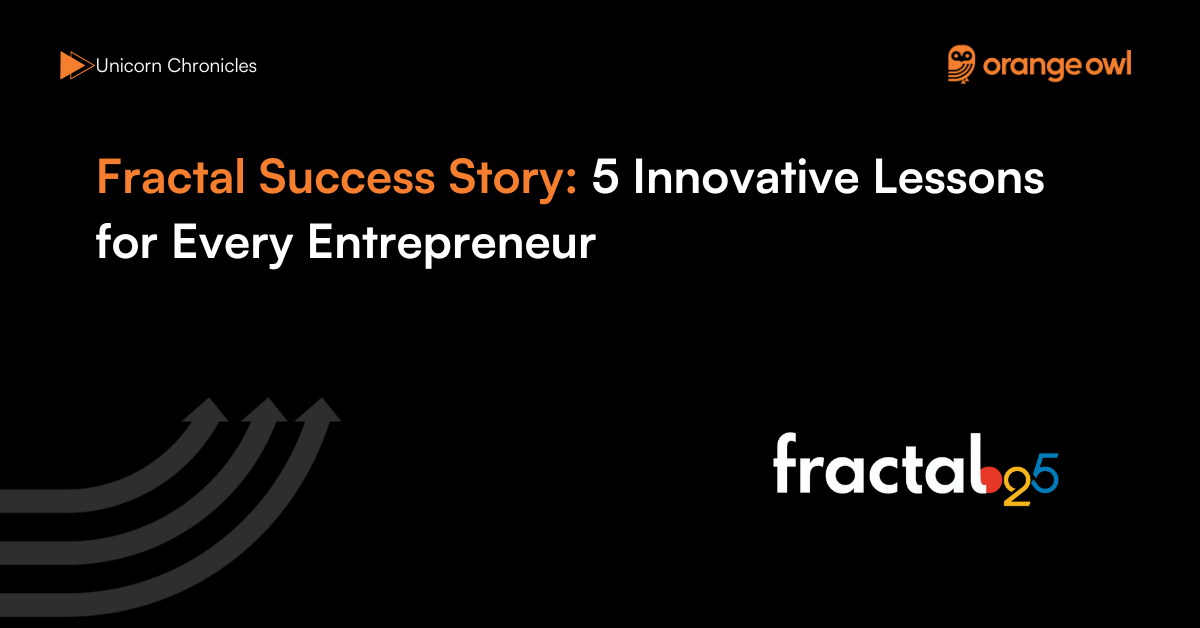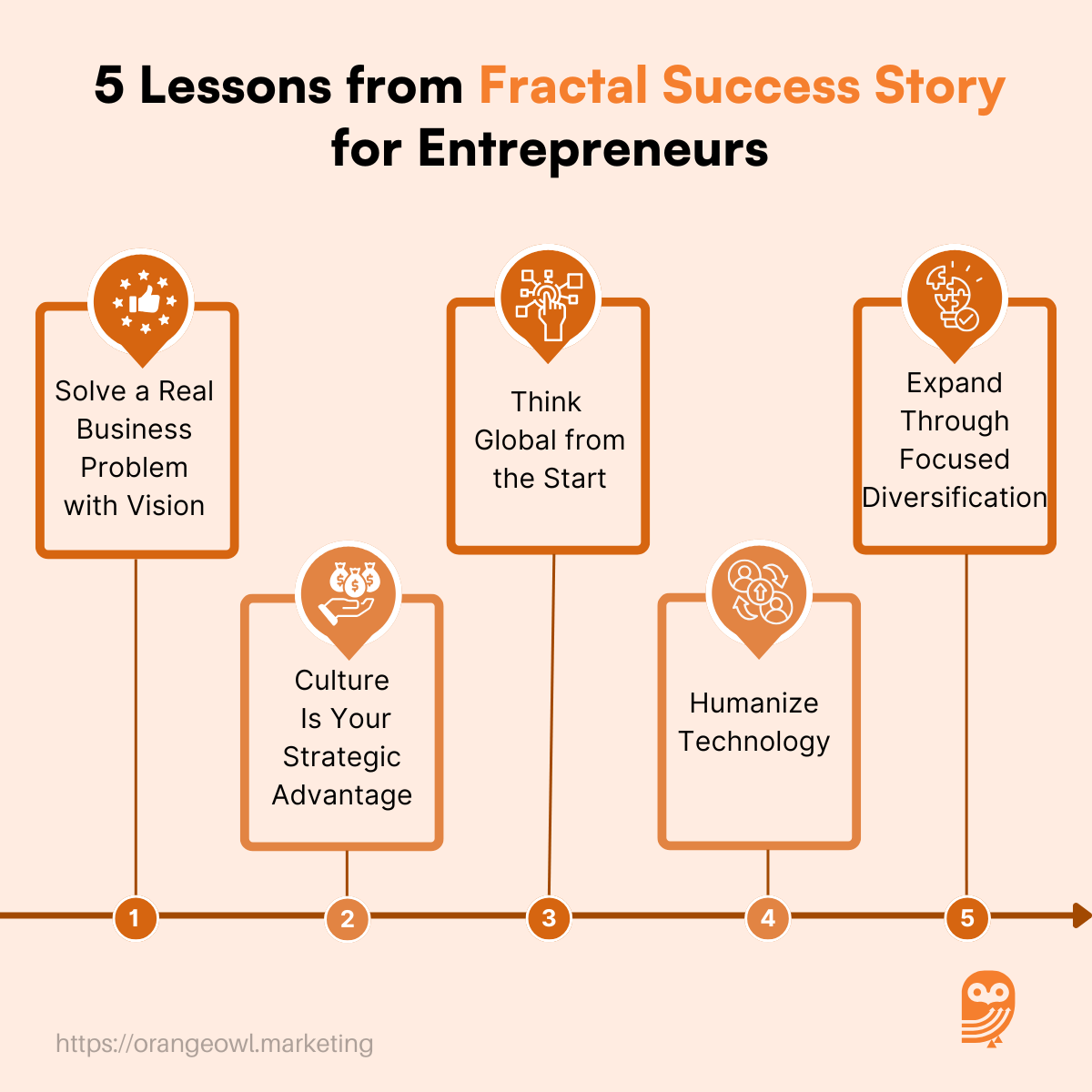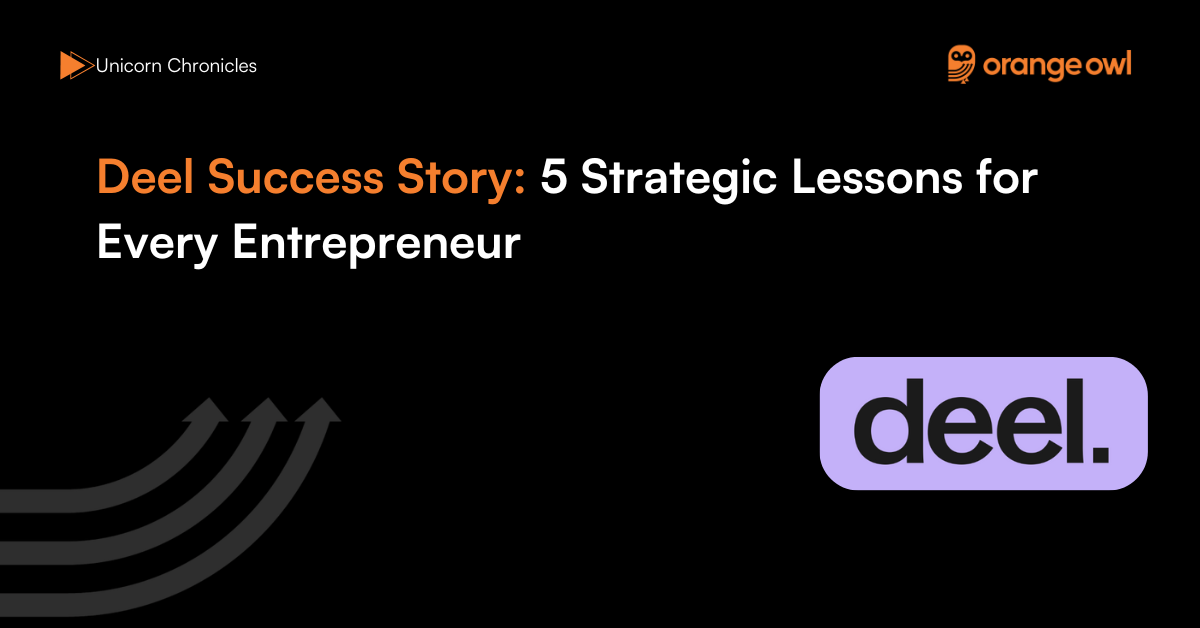Fractal Success Story: 5 Innovative Lessons for Every Entrepreneur
Vivek Goel
April 30, 2025

Table of Contents
Introduction
In a world increasingly driven by artificial intelligence and data, Fractal has emerged as one of the most respected global players in the AI and advanced analytics space. The company, co-founded in 2000 by Srikanth Velamakanni and Pranay Agrawal, set out with a bold mission: to power every human decision in the enterprise. From humble beginnings in Mumbai, Fractal has evolved into a global powerhouse, demonstrating how vision, persistence, and a human-first approach to AI can drive long-term impact.
Today, Fractal serves over 100 Fortune 500 companies across industries such as healthcare, retail, insurance, and financial services. With a team of 4,000+ employees operating in 16 locations worldwide, including the United States, UK, India, Australia, and the UAE, Fractal has cemented its presence as a global analytics leader.
In 2022, the company received a $360 million investment from Apax Partners, helping accelerate its expansion and R&D in AI solutions. Fractal has also launched and incubated pioneering ventures such as Qure.ai (AI in radiology), Crux Intelligence (AI-powered business intelligence), and Eugenie.ai (industrial sustainability analytics), showcasing its commitment to solving real-world problems using cutting-edge technology.
“Fractal is not just an AI company—it’s a company about human decisions. We’ve always believed that AI should be explainable, ethical, and empowering.” — Srikanth Velamakanni, Co-founder & Group CEO
Origin Story
The origin of Fractal is rooted in a powerful realization by co-founders Srikanth Velamakanni and Pranay Agrawal—that while businesses were generating vast volumes of data, they were failing to utilize it effectively for decision-making. In the early 2000s, data analytics was still in its infancy, and the concept of AI-powered business intelligence was just emerging. The founders saw a future where data alone wouldn’t be enough—what companies really needed was intelligence and interpretation powered by AI.
“We started Fractal with the belief that data would be the oil of the 21st century, but it’s really AI that is the engine that drives value from that data.” — Srikanth Velamakanni, Co-founder & Group CEO
Armed with this conviction, Srikanth and Pranay launched Fractal in 2000, initially working out of a small office in Mumbai. Their vision was bold but clear: to empower every human decision in the enterprise by making data not just accessible, but insightful, contextual, and actionable. While most firms focused on building reporting tools or dashboards, Fractal aimed to reimagine enterprise decision-making using a mix of behavioral science, design thinking, and AI technologies.
From the outset, they prioritized building solutions that were not just technically sound, but also deeply human-centric. Whether it was helping a CMO better understand customer behavior or enabling a radiologist to detect anomalies in scans through AI, the focus was always on impact and empathy. This guiding principle—“AI for good decisions”—continues to shape Fractal’s product philosophy even today.
The early team comprised like-minded professionals passionate about analytics, many of whom would go on to become long-standing leaders within the organization. This strong foundational culture helped Fractal stay resilient through market shifts and enabled it to scale thoughtfully while remaining true to its original mission.
By betting early on AI as a transformative force and anchoring their work in real-world business problems, the founders laid the groundwork for what would become one of the world’s leading AI and advanced analytics firms.
Business Landscape and Early Challenges
When Fractal was founded in 2000, the global business environment was only beginning to wake up to the potential of data. Terms like artificial intelligence, machine learning, and data science were largely confined to academic circles or experimental R&D departments. In such a nascent ecosystem, Fractal’s pitch—to help enterprises make smarter decisions using AI and advanced analytics—was met with widespread skepticism.
One of the most pressing challenges was building trust. Many global companies were hesitant to outsource such high-value, strategic functions to a relatively unknown startup from India. There were prevailing concerns around data security, delivery consistency, and whether a remote analytics partner could truly understand complex business nuances. Fractal had to overcome not just technological inertia, but geographic and cultural biases.
“We never compromised on quality. In a service business, that’s your brand. Every client’s success story is what builds your reputation.” — Pranay Agrawal, Co-founder & CEO
Fractal tackled these challenges head-on by obsessing over quality and customer outcomes. One of their early breakthroughs came from working with Citibank, where they were able to demonstrate tangible value through predictive analytics and decision science. This successful engagement became a vital case study, helping Fractal build early credibility in a skeptical market.
Another significant hurdle was talent acquisition. AI talent in the early 2000s was scarce—even more so in India. Rather than rely solely on hiring, the founders focused on building a learning culture within the organization. They actively trained young engineers, invested in internal R&D, and fostered a values-driven team environment that could both attract and retain top talent. This emphasis on culture and learning would eventually become one of Fractal’s biggest differentiators.
Their persistence paid off. Over the next few years, Fractal began to earn the trust of more Fortune 500 clients by showcasing real-world ROI from their AI-driven solutions. Each successful implementation served as a building block for future opportunities, helping Fractal establish itself as a pioneer in the AI consulting space—well before it became a buzzword.
Growth Strategies
Fractal’s growth has been driven by a relentless commitment to research, innovation, and customer-centricity. Rather than offering one-size-fits-all AI solutions, the company made a strategic decision to focus on industry-specific applications that could deliver high impact. This customization allowed them to tackle the unique challenges of key sectors such as healthcare, insurance, consumer packaged goods (CPG), and retail—helping Fractal position itself as a specialist rather than a generalist.
Fractal’s product innovation played a key role in its growth. They launched Qure.ai, a healthcare-focused AI solution that uses deep learning to interpret radiology images. This not only helped the company break into the healthcare space but also established Fractal as a leader in AI for medical diagnostics. Similarly, Eugenie.ai, which focuses on sustainability monitoring, and Crux Intelligence, a business intelligence (BI) platform, allowed Fractal to diversify its product portfolio while staying true to its mission of amplifying human decision-making through AI-driven insights.
In addition to organic innovation, strategic funding has also fueled Fractal’s rapid scaling. In 2022, Fractal secured a $360 million investment from Apax Partners, marking a significant milestone in their journey. This infusion of capital allowed the company to expand its product offerings, enhance AI research capabilities, and accelerate global expansion. The funding also bolstered their ability to hire top-tier talent and invest in scaling their solutions across geographies and industries.
“We’re not here to sell AI tools. We want to amplify human decision-making through responsible, scalable AI solutions.” — Srikanth Velamakanni, Co-founder & Group CEO
One of Fractal’s key strengths lies in its ability to strike the perfect balance between customization and scalability. While their services are tailored to meet the specific needs of each client, their products—like Qure.ai and Crux Intelligence—are designed to be replicable across industries. This hybrid approach has made Fractal a preferred partner for large enterprises, who need both the flexibility to meet their unique needs and the scalability to grow with them.
Marketing Strategies
Fractal’s marketing strategy has been notably low-key but highly effective. Instead of relying on traditional, flashy advertising campaigns, the company invested heavily in thought leadership and educational content. Their approach was centered around building credibility in the AI space through whitepapers, client case studies, keynote presentations, and industry-specific reports. This commitment to being a trusted voice in the industry allowed them to position themselves as experts in AI for enterprises, rather than just another tech vendor.
The company also built a strong brand identity around their core purpose: humanizing AI. Fractal’s campaigns often emphasized the idea that AI should be a tool to empower, not replace, human decision-making. Their slogan, “Powering every human decision”, encapsulates this vision, showing how AI can enhance human judgment in real-world business contexts. This human-centric approach to marketing resonated strongly with enterprise clients, who were more interested in using AI to improve outcomes rather than to simply automate processes.
Fractal’s focus on customer success has been another cornerstone of its marketing strategy. The company understands that in the enterprise world, success stories are more powerful than any advertisement. By ensuring that each client’s experience with Fractal was transformational and measurable, the company turned clients into brand advocates. These success stories, coupled with organic referrals, have generated a tightly-knit network of loyal customers that fuel Fractal’s growth.
“We focus on customer transformation, not just delivery. Our best marketing has been the success of our clients.” — Pranay Agrawal, Co-founder & CEO
By making client success stories a key part of its narrative, Fractal has not only built strong customer relationships but also turned those relationships into organic marketing tools. Referrals and word-of-mouth recommendations within the AI and analytics industry have played a pivotal role in fueling their reputation and expanding their reach.
5 Crucial Lessons Every Entrepreneur Should Learn from Fractal
1. Solve a Real Business Problem with Vision
Fractal’s journey began with a deep-rooted belief in the power of data to transform decision-making. The founders, Srikanth and Pranay, weren’t chasing a passing trend—they were responding to a real business need: helping companies unlock the value hidden in their data. Even before artificial intelligence became the buzzword it is today, they had the foresight to see AI as the key to transforming enterprise decision-making.
Their vision wasn’t based on the technology itself but on the tangible benefits it could bring to businesses looking to make smarter, data-driven decisions. Fractal’s story is one of persistence, where the founders remained steadfast in their mission despite market skepticism and slow adoption of AI by enterprises.
Lesson: Ground your business in a problem worth solving. Stay focused on your long-term vision even if the market is slow to catch up.
2. Culture Is Your Strategic Advantage
One of the foundational pillars of Fractal’s success is its values-driven culture. From day one, Srikanth and Pranay understood that culture would be a key differentiator in attracting and retaining top talent, particularly in a niche industry like AI. Fractal’s culture of curiosity, trust, and collaboration has been pivotal in fostering a strong sense of purpose among employees, helping them weather the ups and downs of rapid growth.
This culture has also played a central role in ensuring that Fractal could maintain high standards of innovation. By creating an environment where employees were encouraged to experiment and question the status quo, Fractal managed to continuously push the envelope on what AI could do for businesses.
Lesson: Culture is not just an HR initiative; it’s the heart of your business. It’s the foundation of execution, innovation, and resilience during growth.
3. Think Global from the Start
Fractal didn’t wait for the Indian market to mature before thinking about global expansion. From the beginning, the founders targeted multinational clients, focusing on solutions that would scale across diverse industries and geographies. This international focus helped them gain a competitive edge early on, allowing Fractal to engage with leading global brands and understand the complex needs of large enterprises.
Rather than being bogged down by local market dynamics, Fractal set its sights on becoming a global leader in AI. Today, their ability to offer solutions that address complex challenges across industries, no matter where they operate, is one of the reasons they’ve been so successful in building a worldwide client base.
Lesson: Think global from the very beginning. Design your products and services for international relevance to avoid limiting your growth.

4. Humanize Technology
Fractal has always prioritized building AI that is ethical, explainable, and centered around human decision-making. This human-first approach is a core differentiator that sets them apart in an industry often criticized for building complex, opaque systems. The company’s initiatives like Fractal Dimension, their design studio, exemplify their commitment to blending design thinking with AI. By focusing on making AI understandable and transparent, they’ve made it accessible to decision-makers who are often intimidated by the complexities of machine learning.
The founders believe that AI should empower people—not replace them. Their commitment to humanizing AI ensures that the technology is designed to complement human judgment rather than replace it, creating a more ethical and sustainable future for enterprise technology.
Lesson: Technology should empower, not alienate. Build tools that people can understand and trust, and always prioritize ethical design.
5. Expand Through Focused Diversification
While Fractal’s core business remains deeply rooted in AI-powered insights for enterprises, the company successfully expanded through focused diversification. Ventures like Qure.ai (AI for radiology) and Crux Intelligence (a business intelligence platform) were spin-offs that aligned with Fractal’s core expertise while tapping into new markets. These ventures not only allowed Fractal to expand its product portfolio but also created additional revenue streams without straying from their core mission of helping businesses make better decisions.
What makes this strategy particularly successful is that Fractal never lost sight of its central vision. The expansion was purpose-driven and integrated seamlessly into their long-term strategy, ensuring that they didn’t dilute their mission or stretch resources too thin.
Lesson: Diversify your offerings where it makes sense, but don’t lose sight of your core mission. Spin-offs can be a great way to expand without compromising on your foundational purpose.
Conclusion: Key Takeaways from Fractal’s Journey
Fractal’s success story is a testament to the power of vision, purpose, and persistence. While their technological innovations in AI and advanced analytics have garnered attention, the true foundation of their success lies in their ability to solve meaningful problems and maintain an unwavering focus on delivering value to their clients. By nurturing top talent, building trust-based relationships, and staying committed to their long-term vision, Fractal has made a lasting impact in the field of enterprise AI.
The company’s journey offers invaluable lessons for entrepreneurs across industries—whether you’re building a SaaS startup or exploring new AI-driven services. Fractal’s approach underscores the importance of being purpose-led, staying people-focused, and never losing sight of the need for continuous innovation. The keys to success lie in solving real-world challenges, fostering a positive culture, and embracing scalable innovation in an ever-evolving market.
Fractal’s story reminds us that with the right mindset and strategy, even the most complex industries can be transformed for the better.


